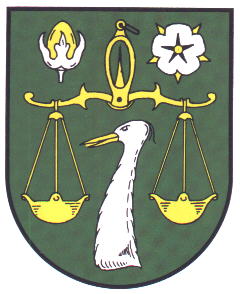Hassel (Weser): Difference between revisions
Knorrepoes (talk | contribs) m (Text replacement - "===Official blazon=== *(de) ===Origin/meaning===" to "{| class="wikitable" |+Official blazon |- |'''German''' | |- |'''English''' | {{blazon wanted}} |} ===Origin/meaning=== ") |
Knorrepoes (talk | contribs) m (Text replacement - "↵↵'''" to "'''") |
||
| (9 intermediate revisions by the same user not shown) | |||
| Line 1: | Line 1: | ||
'''HASSEL''' | '''HASSEL''' | ||
| Line 7: | Line 5: | ||
Samtgemeinde : [[Samtgemeinde Grafschaft Hoya]] (until 2011 [[Samtgemeinde Eystrup]]) | Samtgemeinde : [[Samtgemeinde Grafschaft Hoya]] (until 2011 [[Samtgemeinde Eystrup]]) | ||
[[File:hassel.jpg|center|Wappen von {{PAGENAME}}]] | [[File:hassel.jpg|center|alt=Wappen von {{PAGENAME}}/Arms (crest) of {{PAGENAME}}]] | ||
{| class="wikitable" | {| class="wikitable" | ||
| Line 13: | Line 11: | ||
|- | |- | ||
|'''German''' | |'''German''' | ||
| | | blazon wanted | ||
|- | |- | ||
|'''English''' | |'''English''' | ||
| | | blazon wanted | ||
|} | |} | ||
| Line 27: | Line 25: | ||
The scales are a symbol of justice and symbolise the fact that during many centuries criminals were executed in the village, condemned by the court of the Amt Hoya. The last criminal was executed in 1846. | The scales are a symbol of justice and symbolise the fact that during many centuries criminals were executed in the village, condemned by the court of the Amt Hoya. The last criminal was executed in 1846. | ||
{{de}} | |||
{{media}} | {{media}} | ||
[[Civic Heraldry Literature - Germany|Literature]] : Ziegler, 1986 | [[Civic Heraldry Literature - Germany|'''Literature''']]: Ziegler, 1986 | ||
[[Category:German Municipalities H]] | [[Category:German Municipalities H]] | ||
Revision as of 10:01, 27 December 2023
HASSEL
State : Niedersachsen
District (Kreis) : Nienburg (until 1979 Grafschaft Hoya)
Samtgemeinde : Samtgemeinde Grafschaft Hoya (until 2011 Samtgemeinde Eystrup)
| German | blazon wanted |
| English | blazon wanted |
Origin/meaning
The arms were officially granted on April 30, 1960.
The haselnut is a canting element (Hasel), the name is derived from Haslo, or 'place near the hasel forest'. The rose and the crane's head are taken from the arms of the medieval Lords of Hassel, known since 1219.
The scales are a symbol of justice and symbolise the fact that during many centuries criminals were executed in the village, condemned by the court of the Amt Hoya. The last criminal was executed in 1846.
This page is part of the German heraldry portal Deutsche Wappensammlung |
Heraldry of the World |
|
German heraldry:
|
Selected collector's items from Germany:
|
Contact and Support
Partners:
Your logo here ?
Contact us
© since 1995, Heraldry of the World, Ralf Hartemink 
Index of the site
Literature: Ziegler, 1986












